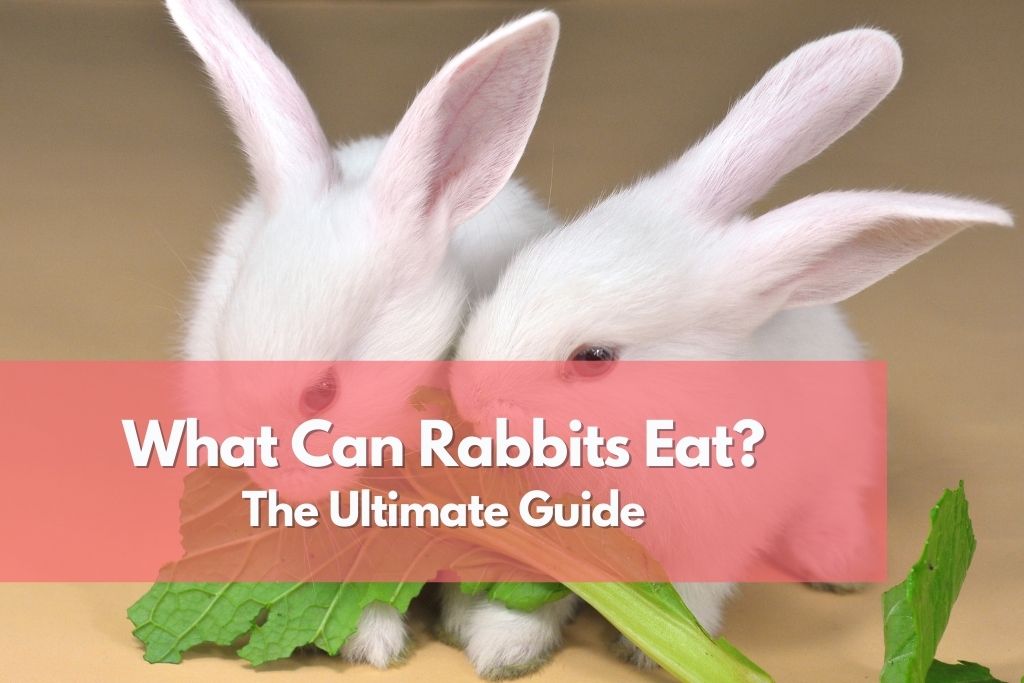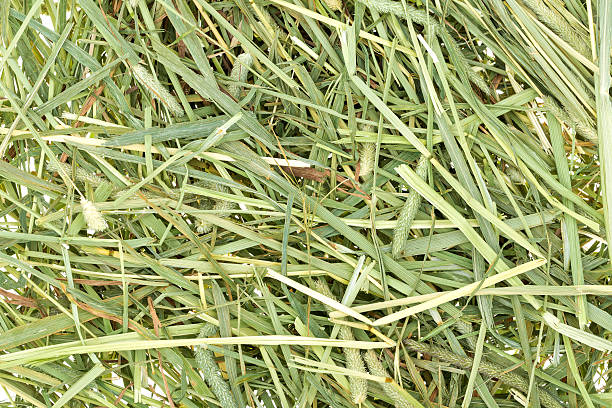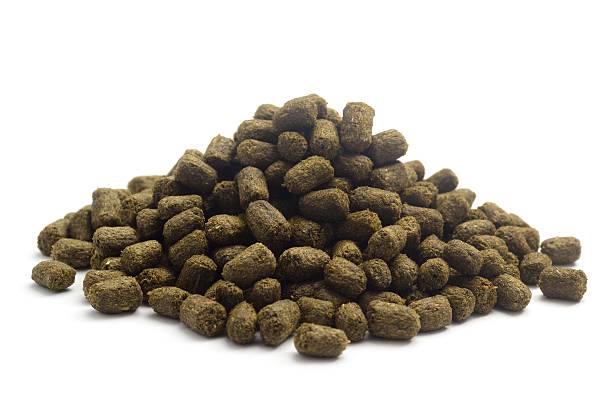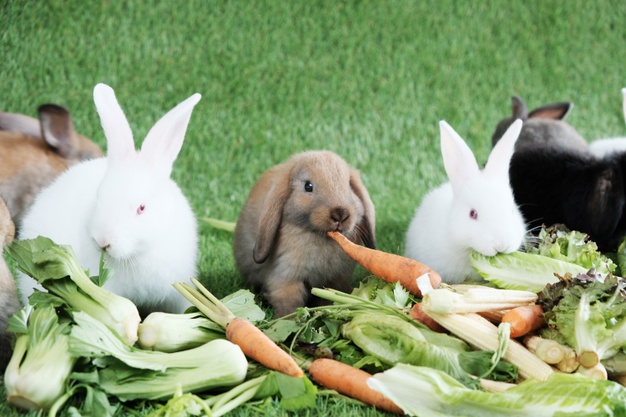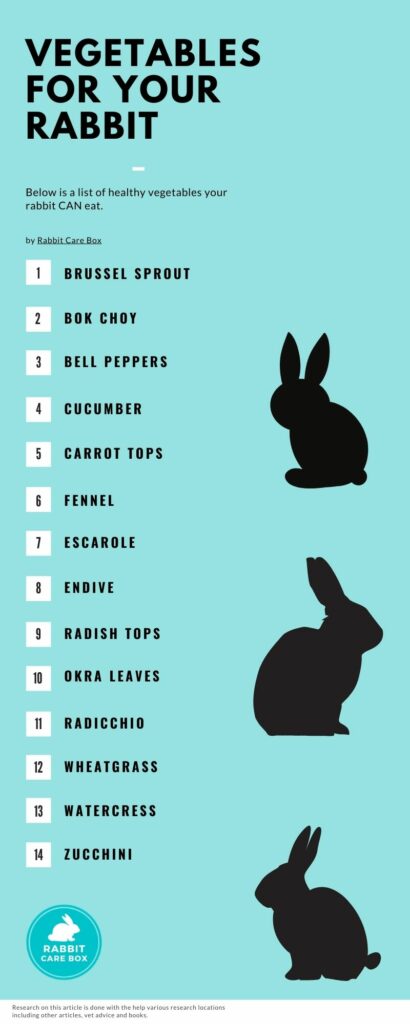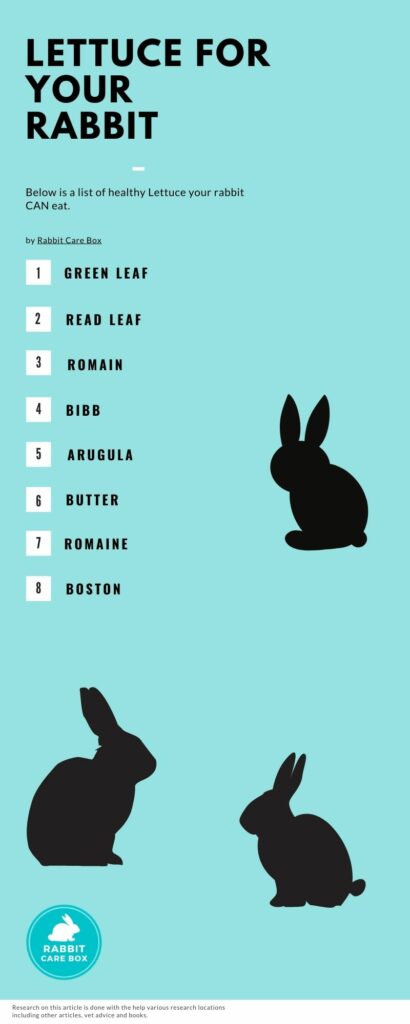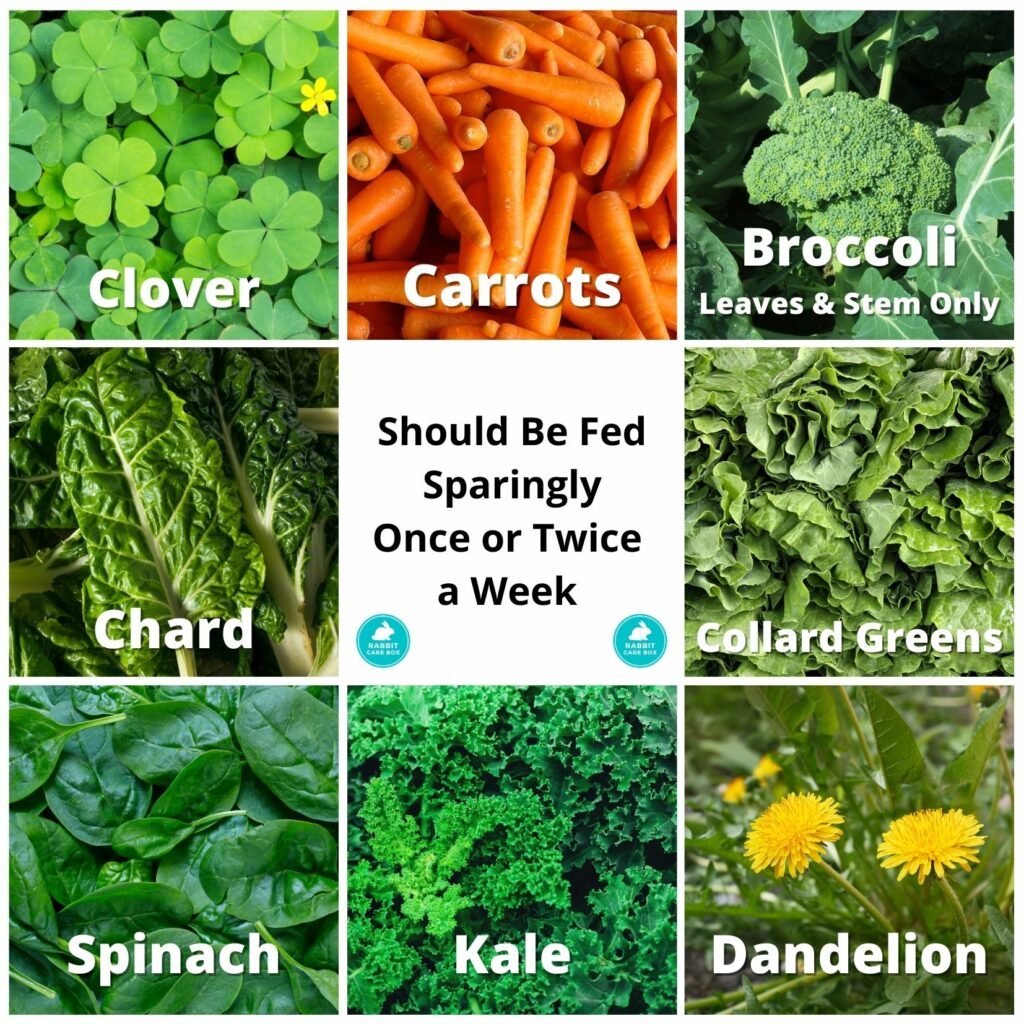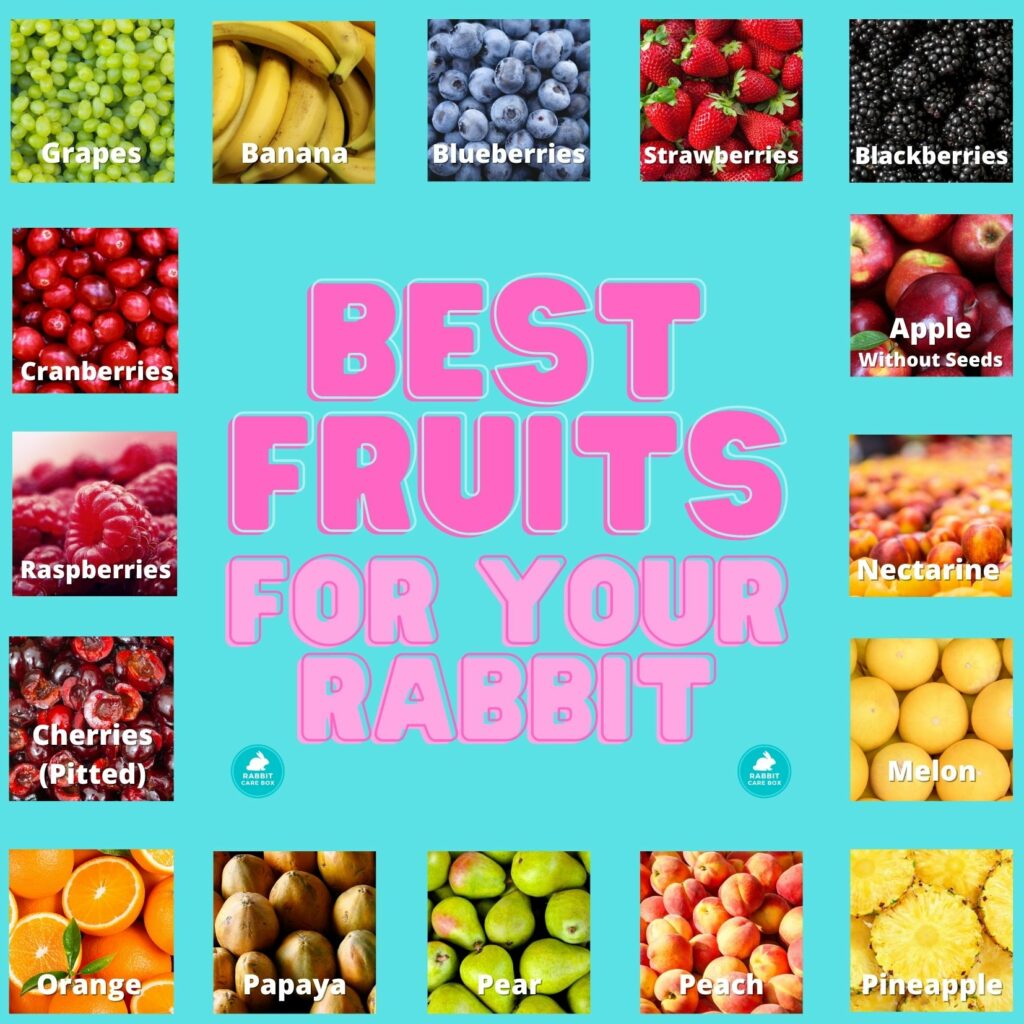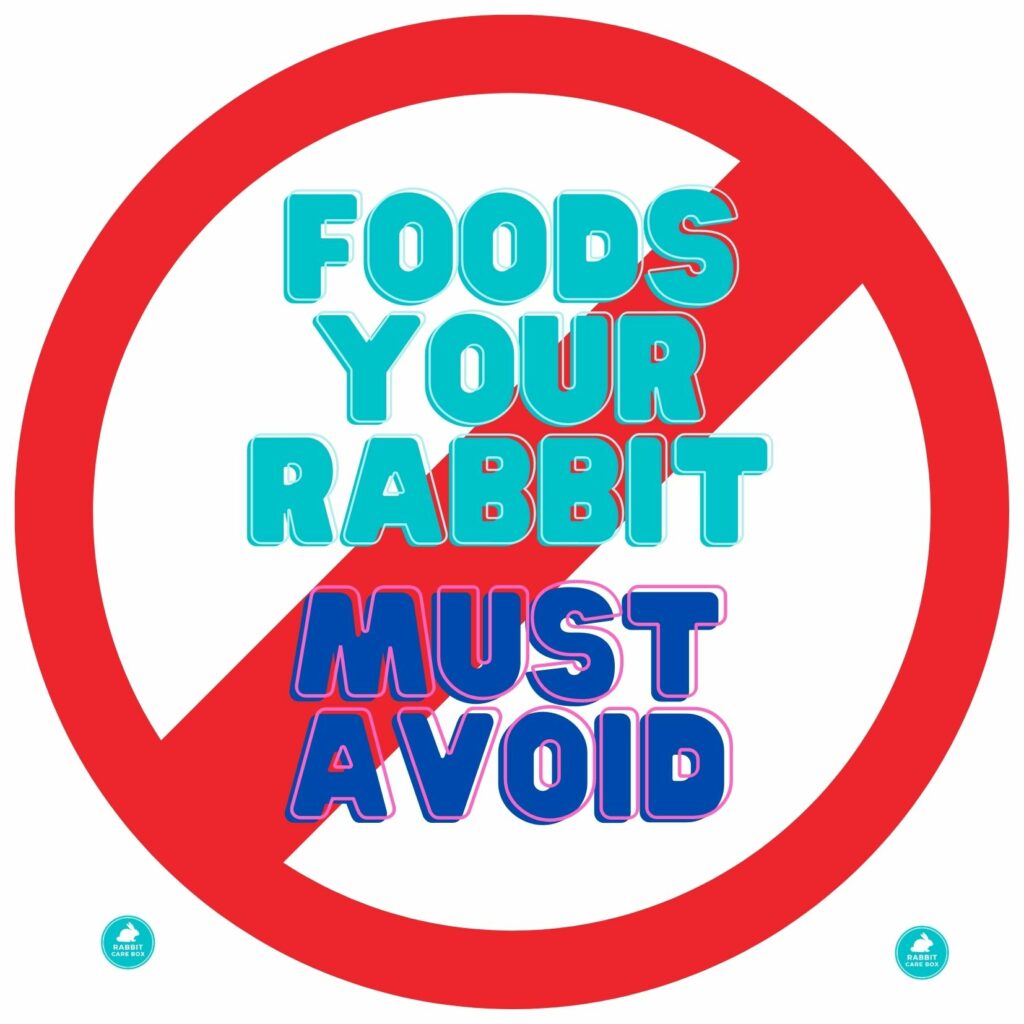Herbs Your Rabbit Can EatBasilCilantroDilMintParsleyOreganoSageRosemaryThymeHerbs Rabbits Can Eat
Vegetables and Greens Rabbits Can Eat sparingly
- Carrots
- Broccoli (leaves and stems only)
- Clover
- Chard
- Collard greens
- Dandelion
- Spinach
- Kale
Fruits That Rabbits Can Eat
Rabbits like eating fruits but not as much as they love their veggies. Fruits should only be given once or twice in a week as they are high in sugars. The recommended serving amount is one or two tablespoons of chopped fruit per pound of your bunny’s weight.
Below are the best fruits you can feed your rabbits safely :
- Apple (without seeds)
- Grapes
- Banana
- Blueberries
- Strawberries
- Blackberries
- Cranberries
- Raspberries
- Cherries (pitted)
- Nectarine
- Melon
- Orange
- Papaya
- Pear
- Peach
- Pineapple
Fresh Water
Apart from all the above mentioned food items, rabbits should be given unlimited access to clean and fresh water all the time. Just like us, they need to stay hydrated. So, make sure your rabbits are drinking enough water. Not to mention, always keep the water bottles or bowl clean and hygienic.
Wash them regularly and change the water daily. Also, we recommend using ceramic water bowls instead of bottles because they are easy to clean and use.
Treats For Rabbits
To keep your rabbits happy, you can give them their favorite treats once or twice in a week to eat. But instead of feeding commercial unhealthy treats, choose healthy alternatives. Some of the best healthy treats include small pieces of fruits (frozen and dried), alfalfa hay, a mix of grasses, a mix of hay and flowers etc. Also, if you do choose commercial treats, make sure to check the labels before feeding them to your pet.
This is because some store-bought treats contain ingredients such as artificial flavors, colors, high sugar and preservatives, that aren’t very good for rabbits. And most importantly, avoid giving your bunnies human treats such as chocolates, ice-cream, sweets etc. Human foods can not only make your bunny sick, but can also kill them.
Food That Rabbits Should Not Eat
Rabbits are herbivores grazing animals, but that doesn’t mean you can feed them any plant you find outside. There are certain food items that shouldn’t be given to a rabbit despite being healthy. Because rabbits have sensitive digestive tracts, they can’t digest many items well and may get sick. In fact, there are some items that can even kill your bunnies.
Below are the things you should avoid feeding your bunny :
Yogurt drops are toxic to rabbits. They can lead to bad bacteria growth in your pet’s tummy and can contribute to several health hazards. Hence, avoid feeding yogurt to your bunnies.
- Bread, Cookies, Biscuits, Pasta
Avoid giving these human treats to your animals. These are high in sugar and fat, so they can cause discomfort to your pet. Also, almost all kinds of packaged food items contain certain preservatives that can be toxic to animals.
Avocado is undoubtedly one of the healthiest foods for humans, but it isn’t the right choice for your bunnies. It can be deadly if ingested by your pets. Hence, it should never be included in their diet.
No cereal like muesli, granola and other made from flaked corn, peas, grains, seeds etc should be given to rabbits. These can cause issues like diarrhea, constipation, dental pain etc.
Yes, you’ve read it right! Iceberg lettuce should not be given to the bunnies. But why shouldn’t you feed this healthy looking green to your pet? you may ask why. The answer is, iceberg lettuce contains a compound called Lactucarium which is very toxic for a bunny. Also, lettuce doesn’t have very good nutritional value as it mostly contains water. So, avoid feeding the light-coloured lettuce to your pets for their better health and well being.
Similar to iceberg lettuce, silverbeet or chard should not be given to the rabbits. According to studies, this vegetable can cause health issues like bloating and colic to rabbits. Instead of feeding this, you can include Romaine lettuce, arugula and other veggies and herbs in your pet’s diet.
You may have more than one pet and feeding the same kind of food for both animals may look convenient but it’s not the right thing to do. While rabbits require a high-fiber diet consisting of high-quality hay, fresh veggies and herbs, hamster food will offer almost nothing to your bunnies. So, don’t compromise and take care of each pet according to their needs.
Walnuts are loaded with fat and not fiber. So, they can cause indigestion problems to your bunnies. So, if you’re looking for healthy treats, feed small quantities of frozen – dried fruits instead.
Oatmeal as such doesn’t cause any harm to rabbits but it doesn’t offer any benefit either. It’s an item that offers just empty calories. Instead of feeding oatmeal, offer an unlimited supply of fresh hay to your bunnies.
No matter how tempting it looks to give a lick of chocolate to your dear pets, never ever do that. Just like with other animals, chocolate is a strict no no for rabbits. It can be really harmful for them and may even cause death. So, reserve that delicious chocolate for yourself and give your bunnies what they deserve.
Just like walnuts, peanut butter is also rich in fat, so it should also be avoided. This creamy and delicious snack will do nothing for your bunny except giving him endless tummy problems.
Potatoes in general are not harmful to rabbits but they aren’t an ideal meal for them. They are just pure carbs and starch which can upset the tummy of your fur friends.
No Never!
Rabbits are herbivores, they can only digest plants and herbs and not meat. So, avoid giving them meat or meat based food items altogether unless you want to make them suffer.
Because cauliflower is a vegetable, most people will feel like giving it their bunny as it seems harmless. But that’s not the case. Cauliflower can cause issues like gas and bloating to your bunnies, hence avoid feeding it. You can give bell pepper, radish, carrot tops instead.
Chips, biscuits, pizza, burger, pasta, tacos etc…aren’t safe for bunnies. Not just the bunnies, junk food should never be fed to any animal because it is loaded with sugar, salt, artificial flavors, preservatives and many other things that are toxic for animals. If ingested, this type of food can cause rapid growth of bad bacteria or worms in your rabbit’s stomach and may even result in the death of your lovely pet.
Just like meat, eggs should also be avoided for rabbits because they’re pure herbivores. The digestive systems of these animals aren’t designed to digest meat, eggs or other animals based products.
Dairy products like milk, cheese, yogurt, ice-cream are toxic for rabbits. These can result in bacterial growth in their intestine due to which he can die. Also, dairy products are very high in sugars which can cause dental issues.
While nuts in small amounts aren’t harmful, they are full of fats which may upset the tummy of rabbits. Also, they don’t offer any necessary nutrition, so it’s better to avoid feeding these things to your bunnies.
This one may come out as a shock because carrots are considered to be the ideal food for bunnies. While rabbits love carrots and they aren’t poisonous either, these veggies are very high in sugar and calcium which can cause health issues to your pets. You can feed your bunny carrots but in a very limited amount and very rarely. And if your bunny is suffering from kidney and urinary tract problems, it’s best to not to give him carrots at all. Instead of this root veggie, you can feed carrot tops almost daily without worrying about anything.
Nightshade family plants are toxic to almost all the animals. These include potatoes, tomatoes, eggplants etc. Especially the stems and leaves of these plants contain a compound that is deadly for animals, so avoid feeding such plants to your rabbit. However, you can feed the fruits of these plants like tomatoes, peppers in small amounts.
If you want your rabbit to stay healthy and fit, never feed him rhubarb. This plant contains high amounts of oxalic acid that can cause some serious kidney issues that may lead to the death of your pet.
These green little veggies might look perfect for your bunnies but they are very high in sugars as well as phosphorus which is not great for bunnies.
Rabbits can’t digest corn and mullets. These items may block their food pipe and GI tract, so avoid feeding them to your furry friends.
Seedless apples are great for bunnies if fed once or twice in a week. However, apple seeds are highly toxic to animals. So, make sure to deseed the apple before feeding it to your bunny.
What Can Baby Rabbits Eat?
Baby rabbits should be taken care of a little extra. At this stage, they are prone to fall sick and may suffer serious health complications if not fed properly. They need good nutrition to grow into healthy adults. The best idea is to replicate the life of wild rabbits for them by offering unlimited access to hay all day.
Wild rabbits eat fresh grass all day. It is their main food component. However, you can’t feed fresh grass to your pet bunnies. So, hay acts as a substitute to grass and can be fed daily without any issue. In addition to good quality hay, you can also feed fresh veggies and fruits to your baby rabbit but in limited amounts. Too much fresh food can upset their little stomachs.
Pellets are also important for young rabbits as they help in maintaining their weight and provide essential nutrients required for healthy growth. But the quantity of pellets should be kept very limited as it can cause weight gain. As your bunny becomes older, you can avoid feeding him pellets and rely him on fresh food and hay.
Also, certain high sugar and high calcium vegetables and fruits should be fed sparingly to baby rabbits. Young rabbits love eating sweet, so they enjoy munching on carrots, beets, parsnips, raisins, berries etc. But the problem is, their digestive system can’t process carbs well.
Young rabbits should be fed only one tablespoon of vegetables or fruits per two pound of their body weight. Moreover, if your has gained a significant amount of weight or have become obese, you shouldn’t give him any fresh food for a while. Instead let him eat plenty of hay that will fulfill his dietary requirements while also maintaining his weight properly.
What Can Adult / Senior Rabbits Eat?
Mature or adult rabbits should be given an unlimited supply of timothy, oats and grass hay. Once your rabbit reaches adulthood, you should limit the quantity of pellets in his diet. Ideally, you should serve about 1/4 cup of pellets per 6 pounds of his body weight. Instead, feed multiple servings of fresh veggies and greens, about 2 cups per 6 pounds of weight.
Make sure to give your bunnies dark, leafy greens daily. A good idea is to give a mix of 2 to 3 different types of greens daily. Further, any light colored green such as iceberg lettuce, silverbeet, should not be included in a rabbit’s diet. Also, colorful vegetables should be given sparingly as we have already discussed.
Senior rabbits: if your bunny is over 6 years of age and not having any weight loss problem, you can offer him the same diet as mature rabbits. However, if your pet is getting weak and has lost a significant amount of weight, increase the portion of pellets in his diet. You can also feed him alfalfa hay which is rich and nutritious but avoid giving it for bunnies with kidney issues.
Furthermore, if your senior rabbit has become obese due to lack of exercise, cut down on the pellets and let him eat hay for some time to maintain an ideal weight.
Related FAQs
What is an ideal diet for a house rabbit?
A pet rabbit’s diet should be made up of plenty of fresh hay, good-quality pellets, fresh vegetables, and lots of water. Apart from these major components, you can feed certain treats like fruits, flowers once in a while and in limited amounts.
What makes the best pellets?
Pellets should be of high-quality quality and fresh. They should contain at least 18 per cent of fiber because rabbits need a high fiber diet. Most rabbit pellets last for about 6 weeks. So, never purchase in bulk as they will remain no good for your pets after 6 weeks. A good idea is to buy fresh pellets in a limited quantity per month or two. Also, we recommend buying alfalfa pellets for young rabbits and timothy pellets for older ones.
What type of vegetables should I feed my bunny?
Vegetables that are low in sugar are good for rabbits. Use dark and leafy veggies and greens for feeding your bunny and avoid giving them beans, rhubarbs and avocado. Have a look at the list we have shared above for more details.
Is hay important for my rabbit?
Yes, hay is the most important part of a rabbit’s diet. It keeps their digestive systems well and also helps in trimming their teeth. So, offer plenty of fresh hay to your bunny.
How much food is required by baby and adult rabbits?
Below is the quantity of food required by rabbits at different stages :
0 to 3 weeks – Mother’s milk
3 to 4 weeks – pellets and alfalfa, mother’s milk
4 to 7 weeks-. Alfalfa, pellets and mother’s milk
7 week till 7 months – unlimited fresh hay and pellets
From 12th week – Start feeding vegetables, one at a time and in limited quantities.
How much food should I give my young bunny? (7 months – 1 yr)
Feed him new types of hays including Timothy, orchard, oats and grass hay and reduce the quantity of alfalfa hay. Further, limit the pellet portion to cup per 6 pounds of his body weight.
How much food should I give my mature bunny? (1 to 5 yr)
Feed him unlimited amounts of a variety of hay and limit the pellet portion to 1/4 cup per 6 pounds of bodyweight.
Start feeding 2 cups of fresh vegetables and greens per 6 pounds of his weight. Also, introduce new vegetables slowly and one at a time.
Fruit ration should be not more than 2 tbsp per 6 pounds of weight.
How much food should I feed my senior bunny? (above 6 years)
If your bunny has good weight, continue with the adult diet.
If your bunny has become weak and thin, increase his pellets portion to help him gain some weight. Provide him alfalfa if there is no kidney issue.
If your bunny has become obese, cut down on pellets and feed him unlimited hay.
Can my rabbits eat flowers?
Yes bunnies can eat flowers but you should feed them daily. They can eat flowers like chamomile, calendula, daylily, honeysuckle, rose, marigold, pansy, hibiscus, dianthus, nasturtium, English daisy etc.
| 